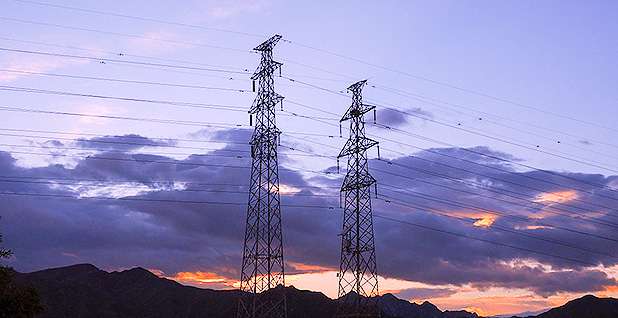The power transmission compromise that could unlock energy permitting deal

House GOP negotiators had been reluctant to include any measure to foster expansion of the transmission network, and instead had focused on changes to the National Environmental Policy Act that would speed reviews for fossil fuel and renewable energy infrastructure. Democrats, however, have prioritized expanding transmission that is needed to connect new wind and solar farms to major power demand centers.
But Hickenlooper and Peters have positioned their legislation as a means to enhance the resiliency of the power grid, along with enabling the spread of more clean energy.
“We think the easiest thing is interregional transfer because that’s a reliability issue and a competition issue and a lower cost to consumers issue,” Peters told POLITICO on Thursday.
The proposal — which was shared with POLITICO ahead of the planned release of the bill, called the BIG WIRES Act — would require regions to be able to transfer at least 30 percent of their peak demand with neighboring regions. That would help avoid events like the outages that hit Texas in 2021, when a brutal winter storm hobbled the state’s isolated power grid and killed almost 250 residents.
To achieve that objective, regions would likely have to build more transmission lines to facilitate the transfer of the power across state lines.
Proponents say implementing an interregional transfer capability requirement — a concept endorsed by the White House and Republican-leaning groups — would be less contentious than other transmission proposals floated by Democrats.
These include measures to enhance the federal government’s backstop authority to approve interstate transmission lines over states’ objections, along with giving the Federal Energy Regulatory Commission the power to spread costs for building transmission lines among ratepayers rather than linking them to developers of a single wind or solar project.
“It’s the easiest of the big three areas,” Peters said.
FERC has already issued a proposal that would set minimum amounts of transfer capacity between regions, but it has yet to issue a final rule. The legislation would add teeth to that regulatory effort, requiring FERC to enact a rule within 18 months.
But it’s still unclear whether Republicans will support any permitting deal that helps transmission, no matter how modest.
Rep. Jeff Duncan (R-S.C), a member of the House Energy and Commerce Committee, told POLITICO he met last week with Peters and other Republicans to discuss transmission policy, which he said was his first exposure to the issue.
He said he recently told Rep. Garret Graves (R-La.), who is one of the House GOP debt ceiling negotiators, to “not give in” to Democrats on transmission since Republicans are “just sticking our toe in the water with regard to that issue.”
“Just to throw something against the wall to see if it sticks in a debt ceiling bill on something Congress doesn’t know much about and hasn’t had any hearings on isn’t the right approach,” Duncan said.
Progressive Democrats, meanwhile, have lined up to warn the White House to not agree to any provisions modifying NEPA in a deal with Republicans to raise the debt ceiling. It’s unclear whether the inclusion of a relatively modest transmission policy would appease them.
Rep. Ro Khanna (D-Calif.), a leader in the House Progressive Caucus, told POLITICO he saw promise in bipartisan permitting discussions that have been taking place among lawmakers in the House and Senate, and argued any solution should not be forced quickly as part of an unrelated need for Congress to lift the debt ceiling.
“Obviously we need to have permitting reform to build transmission lines and transporting clean energy and to build more solar projects, but that has to be a separate process,” Khanna said.
Other Democratic climate hawks who’ve been working on transmission policy acknowledged the proposal on the table would be helpful to spreading clean energy, but they say it falls short of what’s necessary to ensure billions of dollars of green subsidies included in the Inflation Reduction Act are not stranded.
“It’s a good proposal that won’t solve all the challenges around transmission, but will help address some of the key issues as identified by stakeholders I’ve spoken with,” said Rep. Mike Levin (D-Calif.), an environmental attorney, who added his support for a debt ceiling bill would be contingent on how substantial the NEPA components are in comparison to transmission benefits.
Rep. Sean Casten (D-Ill.), who was a clean energy entrepreneur before being elected to Congress, deemed the possible inclusion of an interregional transfer capability requirement “better than nothing” but “woefully insufficient.”